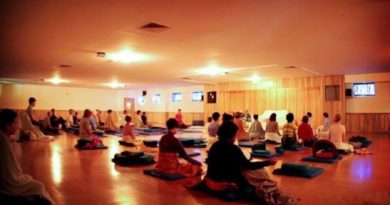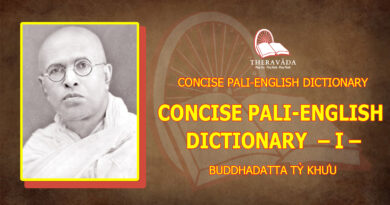Answers By Mr. S. N. Goenka: Mind
-What is mind? Where is it?
Mr. S. N. Goenka: The mind is there in every atom of your body. This is what you will understand by practising Vipassana. With it, you will make an analytical study of your mind, an analytical study of your matter, and the interaction of the two.
-When you say mind, I am not sure what you mean. I can’t find the mind.
Goenkaji: It is everywhere. With ever atom, the mind is there. Wherever you feel anything, the mind is there. The mind feels
So, the mind—you don’t mean the brain?
Goenkaji: Oh no, no, no. Here in the West, you feel that the mind is only here. No, no, nothing doing. It’s a wrong notion.
The whole body?
Goenkaji: Yes, the whole body is mind. The whole body!
(Courtesy: International Vipassana Newsletter, Vol. 39, No. 4, December 2012)
-What is the mind?
Mr. S. N. Goenka: The mind is what thinks! The entire thought process is due to the mind. It is the mind that is constantly involved in the various actions of thinking, reading and pondering over what has been read, etc. During its course of thinking, the mind may act beneficially or harmfully. If it adopts the wrong habit pattern, then it will generate feelings of ill will and animosity for others. If instead, the mind reforms itself, then although it will still have thoughts they will now be thoughts for the well being of others. If someone has shortcomings, the mind will want that person to overcome his shortcomings because now the mind knows that due to his shortcomings, that person will perform wrong actions which will make him more miserable and unhappy. So the mind will harbour thoughts of goodwill towards that person. It will want the person to refrain from doing bad deeds and thus save himself from burning in the fires of suffering. We observe that it is the nature of the mind to generate thoughts all the time. Therefore, our most important duty is to guide the mind towards a healthy thought process and prevent it from taking the path of unhealthy thinking patterns. Our entire effort is aimed towards understanding this nature of the mind and correcting it if it goes on the wrong path.
-Who reforms the mind?
Mr. S. N. Goenka: It is the mind that reforms itself. A part of the mind is always observing its own functioning. If there are thoughts in the mind, it will analyse the nature of these thoughts. Whenever negativity or a feeling of animosity arises in the mind, this same part instantly issues a warning that such negative emotions are undesirable and should not occur in the mind. This part may be called intellect or the part of the mind which is always alert regarding the functioning of the mind and is trying to reform it. If the mind can develop the habit of observing the truth as it appears, then this fact will become clear- that the moment the mind is defiled, it is punished with suffering; and if it is purified, the suffering is removed. It is this observing part of the mind which will understand this process and thus change itself. Nobody wants to remain agitated. Everyone wants to lead a happy life without miseries. To attain this state, the observing part of the mind tries to change the nature of the remaining part of the mind.
-You spoke about taking out the bad qualities from the mind. What does that mean?
Mr. S. N. Goenka: Like you have emotions in you – feelings of depression in you – feelings of animosity towards others. All those are bad qualities. They keep you unhappy. With these you harm yourself and you harm others. Little by little you have to take them out. And you will enjoy great peace of mind.
-What is the connection between the mind and the brain?
Mr. S. N. Goenka: The brain itself is just a physical organ. As you deal with other parts of the body, you deal with the brain in the same way, that’s all. Nothing special to do with the brain. But the mind is totally different. In the West, all importance is given to the brain as if the mind is located here. Nothing doing, it is everywhere. The mind is in the whole body. So give attention to the whole body.
-What is superior to mind?
Mr. S. N. Goenka: First know what mind is. Then you will know what is beyond mind, what is superior to mind.
-If you purify the body, you purify the mind?
Mr. S. N. Goenka: No. Even though you purify the body, the mind may remain dirty and it will again make the body impure. So the root is the mind, not the body. The body is just the base. With the help of the body, the mind is working, but the mind has to be purified. You keep on washing your body as much as you can, but the mind is not washed. Mind remains still impure. Mind has to be pure. But if you purify the mind, the body gets purified. It has an effect. The aim of Vipassana is to purify the mind.
-What is the characteristic of a pure mind?
Mr. S. N. Goenka: Purity is the characteristic of a pure mind. By purity we mean the state of mind which is without any defilements like anger, animosity, ill will, craving, clinging, etc. If there is any such negativity in the mind, how can it be called pure? In fact, it will lead to some negative act of the body or speech. An impure mind will lead to some impure action. This way you not only harm yourself but others as well. On the other hand, if the mind is pure, it cannot act in a wrong way. It will benefit itself and others as well. This is the basic characteristic of this technique- that we purify our mind so that we are saved from doing harmful deeds through our speech and body. We try to develop this quality of purity of mind so that all our acts are beneficial. A pure mind will never generate ill will against any one. Instead, it will generate good will, affection and compassion for one and all. These are the qualities by which the purity of the mind is assessed.
-You say we are meditating (during Anapana) to sharpen the mind. How is the mind sharpened?
Mr. S. N. Goenka: If you are with reality and not reacting to it, naturally the mind gets sharpened. The mind gets blunt when it reacts. More reaction makes the mind more gross. When you don’t react, its natural reality is very sharp, very sensitive.
-What is a sensation?
Mr. S. N. Goenka: Whatever you feel at the physical level on your body, we call it a sensation.
-Why do you get sensation?
Goenkaji: Because you are alive. Your mind and matter—nāma and rūpa—are working together. Where there is no nāma, no mind, one cannot feel. An inanimate body cannot feel sensations. This pillar cannot feel sensations. Wherever there is life, sensations can be felt.
Source: https://www.vridhamma.org







